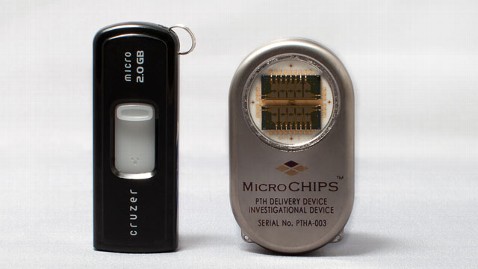Microchip Could Replace Osteoporosis Shots

An implanted microchip, the size of a computer flashdrive, may one day replace osteoporosis shots. Image Credit: MicroCHIPS, Inc.
A microchip could one day change the way many of the 10 million Americans living with osteoporosis manage their symptoms.
One of the greatest challenges of treating osteoporosis by injection is remembering to take the medicine. But a new experimental implantable microchip that releases medication makes it possible to set it and forget it.
In a first of its kind study, Massachusetts researchers implanted the experimental microchip in the waistline of seven women with osteoporosis. The chip released precise dosages of the osteoporosis drug teriparatide, commonly known as Forteo, either prescheduled or triggered remotely by radio communication.
"It enables telemedicine, in which physicians can keep track of their patients and modify as needed," said Robert Farra, president and chief operating officer at Michochips Inc. in Waltham, Mass., which makes the experimental microchip and funded the study.
The daily injections increased bone formation in all seven women, according to the study published Thursday in Science Translational Medicine.
The chip, equivalent to the size of a computer flash drive, remained in place for four months. The women didn't even feel the chip and they experienced no side effects, according to the researchers.
The women were auto-injected with the medication daily for up to 20 days.
According to Dr. Robert Neer, an endocrinologist at Massachusetts General Hospital and co-investigator, treatments fail and diseases worsen simply because patients forget to take their pills, or can't face painful daily injections.
"It [the microchip] makes sure that a patient gets every dose that is expected, because the chip is more reliable than the patient," said Neer.
The microchip follows suit with many other implantable medical devices, such as pacemakers, joint replacements and fluid pumps.
These women may have been given more consistent doses compared to standard self-delivered injections, according to the study. However, the study did not compare the participants' doses and quality of life to those who use standard injections.
Although this preliminary study tested the microchip device on only seven women, the researchers said it sets up more efficient ways for patients to self-administer their own medication, and even for doctors to better monitor their patients' treatments.
The microchip is not currently approved by the U.S. Food and Drug Administration. Further tests still need to prove it is just as safe and effective in a larger group of people.
But, said Farra , given where the technology seems to be headed, a doctor could administer a patient's medication remotely - perhaps one day from a smartphone.
"We have the ability to also house sensors inside the microchip. The microchip is capable of both sensing and drug delivery. At some point we envision that we could combine those two in the same device."
ABC News' Dr. Sarah Combs contributed to this report.